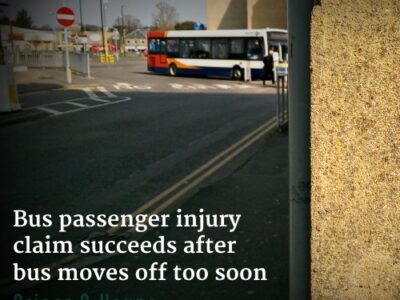I travel to and from work most days by bus.
I usually end up being in a rush to catch the bus at both ends of my journey.
I generally leave my suit in the office and change into it on arrival in the morning. I then get changed again before I head home on the bus. I do this because of past experiences of messing up and damaging my suit during bus journeys.
If I have to work away from Moray for any reason and need to be “dressed up”, I’ll take my suit home with me, so I don’t need to travel a distance via a clothes change in the office.
On a couple of occasions over the last 10 years, when bringing my suit back in to the office on the bus, I’ve accidentally left it behind – in its suitcase on the luggage rack beside the driver.
Thanks to the kindness and efficiency of Stagecoach’s staff at Elgin Bus Station, I’ve always got my bag back intact and very quickly.
Being in a rush
I guess there are a few factors here.
Being half-asleep first thing in the morning is part of it. Also, travelling with an “extra” bag which is not kept on the seat beside me makes me more likely to forget it.
But, mainly, it’s just being in too much of a hurry to get to all the interesting things waiting for me in the office.
Of course, trying to save time and cut corners is something we all try to do every day.
In this article, we’ll consider how a bus driver, arguably, being in too much of a hurry led to an accident at the beginning of a journey from Glasgow to Dunoon and a bus passenger injury claim which went to court.
Mrs Steel’s accident
Mrs Steel (82) had been away in Gibraltar, visiting her daughter. She had come back to Glasgow and stayed the night with her son. He took her to Braehead Shopping Centre so she could get the bus back to her home in Dunoon.
Unfortunately, the bus moved off before Mrs Steel had time to get to a seat, jerking as it did so. This caused Mrs Steel to lose her balance and fall down the steps to the emergency exit.
She broke her collarbone and went on to develop symptoms of anxiety and depression.
Mrs Steel made a claim for personal injury compensation and the case ended up in a court hearing because there was a dispute about how the accident happened.
Competing versions of how the accident happened
Contrary to Mrs Steel’s version, the bus driver said he had watched her in his rear view mirror as she went down the aisle. He said he was sure she was safely seated before he moved off.
He also denied that the bus had moved off anything other than smoothly.
In the Court of Session, Lady Stacey preferred the evidence of Mrs Steel to that of the bus driver.
She accepted that Mrs Steel had not yet found a seat by the time the bus moved off. The movement of the bus, while Mrs Steel was not seated, had caused her to lose her balance and fall.
The judge noted that the bus company’s policy was to the effect that drivers should allow passengers to find a seat before moving off.
It was important here that Mrs Steel was elderly and infirm, and that she had been seen by the bus driver – before he moved off – to be a bit unsteady on her feet.
Lady Stacey’s decision
The bus company were vicariously liable for the failures of the bus driver, who was in breach both of the company’s passenger safety policy and the common law of negligence.
The judge assessed the compensation due to Mrs Steel at £10,000.
How to avoid an accident getting onto a bus
If it is clear from your appearance that you are likely to be vulnerable to losing your balance easily (e.g. because you are elderly), the bus driver should allow you to sit down before moving off from the stop.
The law protects “vulnerable” passengers in this way and, if you fall and suffer injury because the bus moves off before you sit down, you may well have grounds for a claim against the bus driver’s employers.
If you are able-bodied, and the bus company does not have a policy that drivers must wait for passengers to sit down first, it’s probably just your hard luck if you fall because the bus moves off before you’ve had a chance to sit down.
If you have some sort of invisible vulnerability – for example, a medical condition which affects your balance – the best plan is to tell the bus driver, as you get on, that you are unsteady and ask to be allowed to sit down before he sets the bus in motion.
Following this procedure, and communicating effectively with the bus driver, will reduce the chances of you suffering an accident while getting onto a bus.
No court will blame a bus driver who drove off before you were seated, if the driver had no reason to suspect that you were in some way a vulnerable service user.
How we can help
If you have any questions arising from this article or in connection with any aspect of our personal injury claims services, feel free to contact us.
We will be glad to help, and all initial enquiries are free of charge and without obligation.
You can phone Marie or me (Peter Brash) on 01343 544077 or send us a Free Online Enquiry.


 Title Deeds In Moray – A Thing Of The Past?
Title Deeds In Moray – A Thing Of The Past?